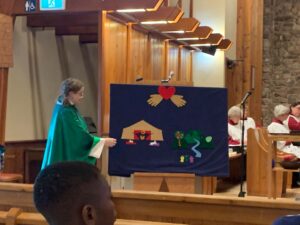All Saints’, Dorval
June 2, 2024

(Prompt to kids: write or draw the most important rule for keeping people safe.)
Today is “Say Yes! to Kids” Sunday, a day to highlight an initiative of the Anglican Foundation that involves congregations and dioceses in fundraising for ministries that help children, both within and outside parish walls. I confess that, as I try to figure out whether it would make sense for us to fundraise for Messy Church through SYTK, the process is complicated and not very user-friendly. But I’m always up for a service that highlights the gifts, contributions, and spiritual lives of children, whatever the pretext.
Our first reading was the story of Samuel, a young child – probably no more than six or seven when the story takes place – who, with a little help from his elderly mentor Eli, learns to hear God’s voice and responds “Here I am!” to God’s call, with just as much faith, courage and commitment as a Moses or a Jeremiah (actually more, since both Moses and Jeremiah claimed they weren’t ready and hoped God would choose someone else).
No actual kids appear in the Gospel reading (although you have to assume they were there, at a sabbath service in a synagogue). But there’s still definitely a connection there. In order to draw it, though, a bit of background is necessary.
As I’ve pointed out before, “the Pharisees” are caricatured in the Scriptures. In all probability, Jesus himself was a Pharisee, or at least spent time in that interpretive tradition and was heavily influenced by it. The Pharisees emphasized precise adherence to the Law of Moses not because they wanted to make their fellow Jews’ lives miserable, but because they hoped and believed that if the people could be made holy enough, God would act and save them from their Roman oppressors. In this way, the Pharisees were opposed to the Zealots when it came to tactics; they share the goal of getting rid of the Romans, but the Zealots preferred the more direct approach of armed rebellion.
Of course, humans being humans, there were certainly members of the Pharisaic tradition who were on a power trip, and/or who were the hypocrites that Jesus accused them of being. But no more than the average percentage of hypocrites and people on a power trip in any group of humans engaged in a common endeavour – which, of course, is the point. The Gospels teach us to be on the lookout for hypocrisy and power trips in any context where we find ourselves.
In this interaction, Jesus is drawing on the time-honoured Jewish concept of pikuach nefesh, literally “preservation of life”, defined by the Jewish novelist Sacha Lamb as “the primacy of saving lives; an indication that this value surpasses all other values in terms of Jewish law.” This principle governs Jewish interpretation of sabbath observance to this very day.
A year or two before moving to Montreal, I was taking the MTA in Boston on a Saturday. As I approached the turnstile, I saw a young man wearing rumpled blue surgical scrubs and a yarmulke. He stopped me and asked, “Would you swipe my CharlieCard for me?” He started to explain that this was because it was the sabbath, I said something to try to make clear that I understood exactly what he was asking, I swiped his card for him, and we both went on our ways, him hopefully to go home and get a good night’s sleep.
That interaction, to me, epitomizes the spirit of pikuach nefesh: an observant Jew, who had clearly been working his butt off on the sabbath saving people’s lives, who was now going home to get some actual rest, but who still wanted to respect the holiness of the day by obeying the prohibitions on spending money or actively using electricity. And it was this spirit that Jesus’ interlocutors had lost sight of, by quibbling about him healing people on the sabbath.
And here’s where we circle back to kids: because if you want to get a solid ethical read on questions like this, you could do worse than ask a kid. Think of all the things we learn in kindergarten, and then maybe have a harder time than we should, actually following through on when we become adults: keep your hands to yourself. Leave other people’s things alone. You get what you get and you don’t get upset. Clean up, clean up, everybody do your share.
Kids have a way of cutting right to the heart of a matter. Should we fix this man’s hand? Of course we should. Should Samuel answer God’s call? Of course he should.
That isn’t to say that it’s then easy to actually do what we know we should do. But if you want a straightforward take on an ethical dilemma, ask a child.
And if you can’t find a child, pikuach nefesh – preservation of life – is a pretty good standard.
Amen.
Leave a Reply